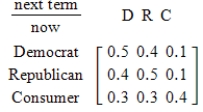In a certain city, the Democratic, Republican, and Consumer parties always nominate candidates for mayor. The probability of winning in any election depends on the party in power and is given by the following transition matrix. 
Using the given transition matrix and assuming the initial-probability vector is  , find the probability vector for the fourth stage of the Markov chain. (This initial-probability vector indicates that a Consumer is certain to win the initial election.)
, find the probability vector for the fourth stage of the Markov chain. (This initial-probability vector indicates that a Consumer is certain to win the initial election.)
A) 
B) 
C) 
D) 
E) 
Correct Answer:
Verified
Q168: Find the steady-state vector associated with the
Q169: The local community-service funding organization in a
Q170: A Markov chain has transition matrix
Q171: Suppose a government study estimated that the
Q172: A man owns an Audi, a Ford,
Unlock this Answer For Free Now!
View this answer and more for free by performing one of the following actions

Scan the QR code to install the App and get 2 free unlocks

Unlock quizzes for free by uploading documents